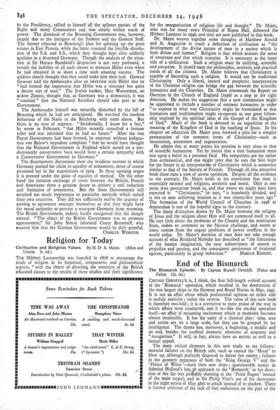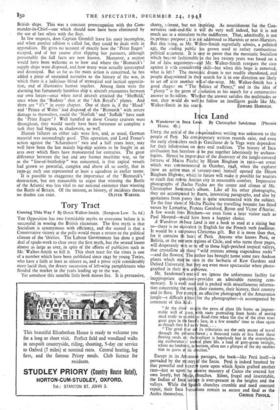End of the Bismarck
The Bismarck Episode. By Captain Russell Grenfell. (Faber and Faber. 12s. 6d.)
CAPTAIN GRENFELL'S is, I think, the first full-length critical account
of the ' Bismarck' operation, which resulted in the destruction of the two largest ships in the German and Royal Navies in May, 1941.
It is not an affair about which professional opinion on either side is unduly sensitive ; rather the reverse. The value of-this new book is therefore two-fold ; it is a corrective to mere praise of the way in which affairs were conducted, and it is—like the six-day operation itself—an affair of mounting excitement which at moments becomes almost intolerable. It has the unity of a classical play: time, area and action are on a large scale, but they can be grasped by lay intelligence. The theme has, moreover, a beginning, a middle and an end, besides the cardinal dramatic elements of suspense and " recognition." It will, in fact, always have an artistic as well as a factual appeal.
The main critical elements in this new study as are follows: material failures on the British side, such as caused the 'Hood ' to blow up, although perfectly disposed to defeat her enemy ; failures in the gunnery apparatus of both the 'King George V ' and the `Prince of Wales '—both then new ships ; questionable tactics in Admiral Holland's line sf approach to the 'Bismarck,' in his direc- tion of fire (he was probably shooting at the ' Prinz Eugen ' instead of the main target), and in Sir Philip Vian's use of his destroyers in the night action of May 26th to attack instead of to shadow. There is further criticism of the lack of fuel endurance on the part of the British ships. This was a constant preoccupation with the Com- mander-in-Chief--one which should now have been eliminated by the use of fast oilers with the fleet.
In few respects, does Captain Grenfell leave his story incomplete, and when another edition is called for, they could be dealt with in appendices. He gives no'account of exactly how the `Prinz Eugen ' escaped, and of her course after slipping her pursuers, although presumably the full facts are now known. Moreover, a section would have been welcome as to how and where the ' Bismarck's ' supply ships were disposed, and how many were actually intercepted and destroyed. But so far as the main action is concerned, he has added a piece of sustained narrative to the history of the war, in which there is a judicious blend of strategical and tactical apprecia- tion, and of illustrative human touches. Among them were the alarming but fortunately harmless ship v. aircraft encounters between our own forces—once when naval aircraft attacked the ' Sheffield,' once when the `Rodney' shot at the ' Ark Royal's ' planes. And there are " iPs " in every chapter. One of them is, if the ' Hood' and ' Prince of Wales ' had disposed' of the ' Bismarck' with severe damage to themselves, could the ' Norfolk' and ' Suffolk' have sunk the ' Prinz Eugen ' ? Well handled as those County cruisers were throughout, they would surely have been fortunate to complete a task they had begun, as shadowers, so. well. Human failures on either side were few, and, as usual, German material was astoundingly good. This operation, and Lord Fraser's action against the Scharnhorst ' two and a half years later, may well have been the last mainly big-ship actions to be fought in an area over • which fleets have manoeuvred for centuries. The great difference between the last and any former maritime war, so far as the " line-,of-battleship " was concerned, is that capital vessels had grown so powerful, complex and above all so costly, that in 1939-45 each one represented- at least a squadron in earlier terms.
It is possible to exaggerate the importance of the ' Bismarck's' destruction, but not reasonable to argue that winning the Battle of the Atlantic was less vital to our national existence than winning the Battle of Britain. Of the interest, as history, of incidents therein



































 Previous page
Previous page